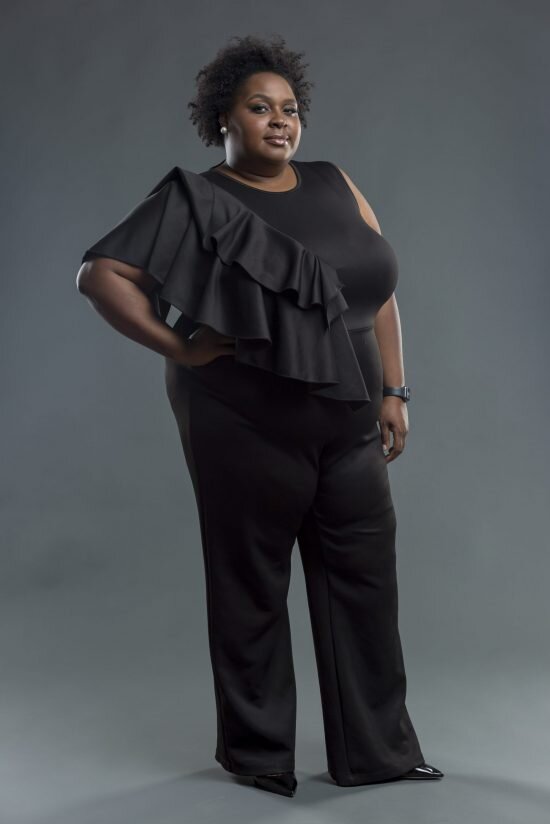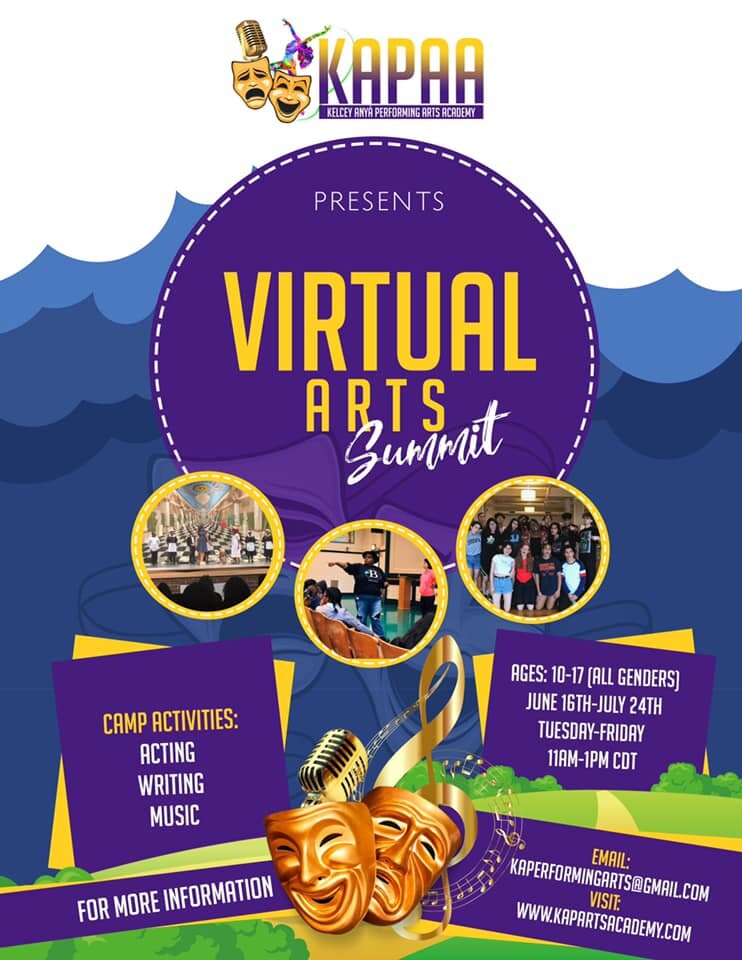The Statera community is made up of incredible artists, actively forwarding the gender parity movement through their participation in Statera Mentorship, Membership, and through their own individual work. We continue to be inspired by their innovation through the last few months, as they find ways to continually advance their artistry and activism within the limits of a global pandemic.
One of our Statera Ambassadors, Kelcey Anyá, has dreamed of opening up her own performing arts academy for years, and has just launched an action-packed virtual summit! We caught up with her to hear all about her work, and why programs like the Kelcey Anyá Performing Arts Academy are needed in the lives of young artists today.
Photo by Mikki Schaffner.
StateraArts: What drives your work?
Kelcey Anyá: My work centers around the development of youth. This means cognitive, emotional, spiritual and artistic development. I want to leave a mark, not necessarily through celebrity or notoriety, but by having a lasting positive impact on people. I believe that the only way to build a stronger future, full of better adults, is to invest in kids. We need to spend more of our time and resources developing and nurturing them to set the tone for who they will become. Whenever I was experiencing the tough stuff in life as a kid, I always ran back into a dance class. I’d have a rough day and immediately turn to, “I wanna go to church and I wanna dance!”
SA: Tell us about the Kelcey Anyá Performing Arts Academy!
KA: So, we’ve got two things going at the moment. One is KAPAA in its entirety, and the other is the Virtual Summer Summit, which is our inaugural program. As a whole I wanted to create a space where art is cultivated in young people without focusing on just one discipline. Having a hand in so many aspects of the arts has helped develop me as an artist, so I’m creating that same opportunity for young artists! I desire to be a brick and mortar school someday, and long-term I want it to be a performing arts high school!
With everything so up in the air because of COVID19, I needed to lean into the virtual space that we have as a way of launching KAPAA and getting students and parents familiar with the program. We have a full and exciting schedule for each week of the summit! Tunes Tuesday is a music production class, Writing Wednesday is for spoken word and playwriting, Theatre Thursday is their acting class, and on Feature Friday we have people professionally working in the arts come talk to the kids. Friday is really important to me, because it actively disrupts how elitist the arts can be by bringing professionals face to face with them.
I hope and pray that the program is so affordable someday that eventually it doesn’t come out of the pocket of my participants. We currently have four fully-funded participants for this summit, which is a huge victory!
SA: What does it mean for a kid to have this kind of experience in the arts at a young age?
KA: I think it’s everything. There are so many statistics that tell us it’s needed. Intercommunication skills all happen organically in the arts. I don’t think people truly understand how much of that these kids are getting in such a short amount of time. There is so much encouragement and uplifting happening just as a by-product of the way the arts are structured. Kids who don't have that at home or in their everyday life seek out the arts as asylum. For kids with trauma, this platform is safe and non threatening. If they don’t quite have the words for what is happening to them, they have a place to process it artistically.
Photo by Mikki Schaffner.
The arts are a non-threatening place to get educated. People will come sit in a play about racism because the fourth wall makes them feel safe. A play that is done right will have you questioning and thinking even beyond the walls of the theatre. This upcoming generation is on the front lines of the things happening in the world and they need this space to express. Gen Z is killing it! I’m excited to see how they shape this industry.
What does building KAPAA mean to you?
KA: It means a lot to me, it makes me emotional. The world needs this right now. It’s a bit of a dumpster fire out there! We have little Ava Duvernays and Spike Lees that aren’t being developed or cultivated. It’s not that they don’t want to be, it’s that the resources aren’t available. Or if they are, there are companies that are white-led and enter into their neighborhoods and end up exploiting them without truly developing them, sort of saying, “look what I did with my white dollar for these Black kids”. It’s frustrating for me to see. I wanted to create a program open to all races and genders, led by a Black woman.
This country was founded in a way that separated people on purpose. It’s systemic. If you’re able to escape your own oppression, you rarely have the resources to bring others with you. We’ve stopped more societal Harriet Tubmans from happening. This program is about giving kids a space to process what's going on in our current world. You can’t talk about the Civil Rights Movement without talking about the Harlem renaissance. The conversations we have about MLK and Malcom X can’t happen without mentioning Toni Morrison and Audre Lorde, or Nikki Giovanni and Angela Davis. They are all equally as radical and as important for us to understand ourselves.
We need to make the modern day Harlem Renaissance happen for these kids. We are not yet truly empowering people to use their voices. We are only regurgitating what has already been created. It’s time to make room for paths that haven’t yet been created by these young people. The kids who have been alive from 9/11 until now have a lot to say about what is going on in this world.
Mentorship is at the core of the STATERA mission. Tell us about one of your mentors. How did they shape you or provide pathways for opportunity?
KA: I have been so blessed to have black women that I can look up to, specifically in the arts. I know not a lot of people have had that. My sister Ayanna has always been an angel to me. She was doing a gospel stage play and she made me her stage hand when I had never done theatre before. She helped cultivate my presence in the arts. Torie Wiggins is a huge mentor for me. “Help” isn’t even a big enough word. She was the only Black professor at my university and I was the only Black student. I was trying to make art about Black women and she was a safe space to be candid and free in. I don’t know if I would’ve completed my program without her. When I was in spaces where I was discouraged by white professors to not get an MFA or PHD, she was there with the weed whacker to destroy any fears that took root. There are so many amazing Black women artists who have paved the way. The sacrificial lambs before me were so willing to reach back and pull me up with them, have tough conversations, and answer tough questions.
To learn more about KAPAA, visit their website, FaceBook page, and Instagram.
ABOUT KELCEY
Kelcey Anyá is a multi-disciplinary performing artist hailing from the bayous of South Louisiana. She began her performance career at the tender age of 2 years old where she began dancing and fell in love with all things performance. Her passion grew when acting and singing entered the picture. A few of her favorite credits include “The Stories of Scheherazade” (2008), “Shakin’ The Mess Outta Misery” (2013), “The Color Purple” (2014), and “Same Blood” (2018).
In April of 2019, Kelcey Anyá wrote, produced and performed her first solo show “Out of the Box”, followed by choreographing the regional premiere of A “Hard Knock Life: A dance adaptation of Annie” with Cincinnati Black Theatre Company in June, culminating with receiving her Master’s of Arts in Theatre, Performance and Practice with certificates in both teaching and Women’s Gender & Sexuality Studies from Miami University (Oxford, Oh) that following August. Upon graduating, she moved to New York City where she is pursuing her passion for making the performing arts more accessible to Black and Brown youth.
_format-1500w.png)
.jpg)

